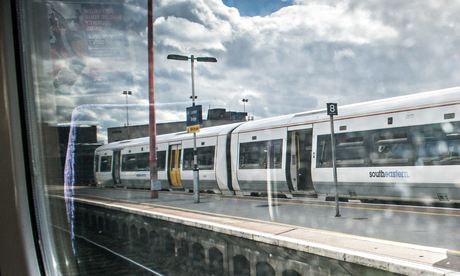The story below is interesting but what exactly does the following sentence mean?
"Suspicions were raised last autumn when a ticket inspector at Cannon Street station in London noticed he had paid the £7.20 fare incurred by passengers who fail to tap in."
Is it possible that the journalist who wrote the story did not understand this sentence? And yet this sentence is key to the total story.

A commuter who was alleged to have dodged train fares to London worth close to £43,000 has avoided prosecution after making an out-of-court-settlement with Southeastern railways.
The man, who kept his anonymity as a result of offering to make the extraordinary payment, travelled for five years from a rural station in East Sussex into London Bridge only paying £7.20 for his journey by exploiting a loophole in the Oyster card system, Southeastern discovered.
He was described as a City executive by the Sunday Times, although Southeastern could not confirm or deny that.
The commuter is said to be a senior executive and boarded the train at Stonegate station in the High Weald, close to the villages of Ticehurst, Wallcrouch and Burwash. There is no barrier at the station so he could board without being detected. Southeastern said it did not know how he managed to avoid detection by ticket inspectors on the train itself.
"There seems to be one law for the rich and one law for the poor when it comes to criminal prosecution," said Manuel Cortes, leader of the TSSA union which represents railway workers. "The rich seem to be able to walk away and claim secrecy while the poor get hauled up in front of the local magistrates court and publicly ridiculed. This guy can buy silence, but that isn't offered to most people who are caught fare dodging."
Suspicions were raised last autumn when a ticket inspector at Cannon Street station in London noticed he had paid the £7.20 fare incurred by passengers who fail to tap in. Further investigation revealed that he was on Southeastern's database of season ticket holders but he had stopped buying a season ticket in 2008. When he applied for a new season ticket shortly after being challenged, suspicions grew.
"It suggested to our investigators that he hadn't been buying anything," said Rupert Atterbury Thomas, a spokesman for Southeastern. "When our revenue team calculated the cost he made an offer which is the £43,000 and he settled on it. There has been no admission of any sort of guilt."
The payout was calculated on the basis of single fares. This meant the settlement cost him £20,000 more than if he had bought season tickets. The train company defended the decision not to prosecute.
"[Out-of-court settlement] is something that people have a right to do in this country," said Atterbury Thomas. "The punishment is the big amount of money. Fare dodging is something we take very seriously to protect the proceeds of everybody else's tickets. We are rigorous in making sure we catch the people who dodge the fare."
Fare evasion over a long period of time is often treated as fraud and cases are normally handed to the British Transport police. Nationwide, the crime costs train operators about £210m a year, according to conservative estimates made by the Association of Train Operating Companies.
The City manager from Sussex is not the only executive to avoid prosecution. Gray Hooper Holt, a law firm which specialises in fare evasion cases, last year acted for a "professional financier" who was accused of fare evasion and giving a false address by First Capital Connect. The case was dropped after the lawyers intervened, enabling the financier to avoid a criminal record. In another case in 2012 the firm acted for "a senior financial adviser for an international company for whom a successful prosecution for railway fare evasion or fraud would have led to the loss of his job and his career". He was accused by Greater Anglia railways but the parties reached "an informal settlement".



No comments:
Post a Comment